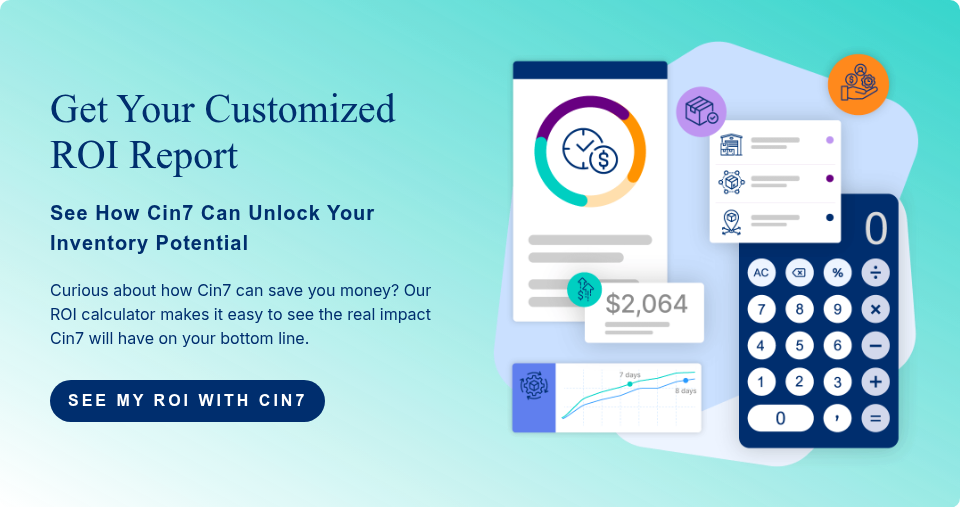Maximize the Cost-Saving Benefits of Inventory Management Software With Cin7

Growing a business is an exciting time, but it can also feel overwhelming. The more sales you receive, the more work it takes to process orders, keep track of inventory, and maintain continual fulfillment.
Hiring people to handle the additional work might seem like the only way forward, but that can actually make it difficult to scale efficiently. If you have to hire more employees every time your orders increase, then sales growth will always lead to significant expense growth.
That said, it does take money to make money. The key to scaling a product business lies in what you spend your money on. Investing in inventory management software (IMS) allows sellers to create inventory efficiency at scale, which delivers valuable cost savings over time and frees up more resources to grow.
What is inventory management software?
Inventory management software (IMS) helps sellers track inventory levels and automate related processes, such as procurement, order management, and reporting. For many sellers, inventory management starts in spreadsheets. While this may be enough to get your business off the ground, it can hold you back as you look to make it to the next level.
In contrast, one of the main advantages of inventory management software is that it empowers sellers to grow without getting trapped under the burden of inventory.
Benefits of inventory management software
Finding the right IMS can transform your business from a company run by highly manual inventory management workflows to an efficient and streamlined operation that empowers sellers to take advantage of economies of scale and grow more cost-effectively.
Here are some of the benefits of inventory management software your business can enjoy:
- Accurate inventory data: Automated inventory tracking offers more precise inventory counts that you can access in real time, which means less money spent on purchasing and holding surplus stock.
- Product visibility: Get real-time visibility into items as they move through the product lifecycle and supply chain so you can optimize logistics and reduce transportation and storage costs.
- Fewer manual workflows: Use automation to eliminate time-consuming manual tasks, like taking stock or order processing. This frees up time to focus on customer interactions and growth.
- Increased productivity: By automating routine tasks, like tracking stock levels and reordering, you can get more done with fewer people and maintain your business without needing to increase headcount every time your sales volume grows.
- Improved demand forecasting: Leverage historical inventory data and sales metrics, such as inventory turnover and velocity, to generate more accurate demand forecasts and reduce costs associated with overstocking or stockouts.
- Ability to add new sales channels: Easily scale through new channels using integrations and real-time data sharing without having to hire more people.
- Data-driven decision-making: Monitor and track inventory performance metrics, such as your inventory turnover ratio and cost of goods sold (COGS), to make better decisions about product mix and pricing so you can improve overall profitability.
- Business cost reduction: By streamlining operations, leveraging automation, and increasing inventory accuracy, you can reduce overall costs and have a leaner and more agile company.
How inventory management software reduces costs
The benefits of investing in inventory management software can include immediate cost savings in three key areas: inventory, order accuracy, and labor costs.
Optimized inventory levels
Having too much or too little product can be expensive. A study by IHL Group projected that inventory distortion would cost the retail industry $1.77 trillion in 2023, equivalent to 7.2% of sales.
Inventory distortion includes issues like excess inventory, stockouts, and inaccurate stock levels. The good news is that it can be prevented with the right tools.
Optimizing inventory through real-time tracking and visibility helps product sellers keep the right amount of inventory on hand. This reduces the storage, discounting, and disposal costs associated with overstocking and cuts down on lost sales caused by stockouts.
Cin7 helps you improve purchasing by showing real-time inventory amounts for each item in your purchase order. This gives you the option to remove any line items you don’t need or increase your order for items with lower stock levels.
Say you have a purchase order that includes 50 units of a product with a total price of $3,000, but your real-time stock levels are still high. Removing this line item saves you $3,000 instantly and frees up warehouse space, so you don’t need to expand to hold more items.
By optimizing inventory in this way, you can also reduce overstocking and the costs you’d incur if you had to discount the surplus stock or dispose of the product if it didn’t sell.
Improved order accuracy
Incorrect orders don’t just cost your business in terms of negatively impacting customer experience. Fixing order errors involves expenses like return processing, restocking, and reshipping.
One study estimates that the costs associated with a return range from 39% to 55% of the item’s value. In other words, a return for a $50 item would cost sellers $19.50 to $27.50 in transportation, processing, and service fees.
Using an IMS to track inventory and automate order processing reduces costly mistakes caused by human error and manual data entry. Not to mention, accurate order processing improves customer satisfaction, helps build loyalty, and encourages repeat purchases.
Reduced labor costs
Automating manual and routine workflows with a Cloud-based inventory management system helps your teams increase productivity and accomplish more in less time. Specifically, IMS automation can eliminate physical inventory counts and reduce manual order processing.
Cin7 also makes it easy to receive inventory, keep track of items in the supply chain and fulfill orders using barcode scanning.
By automating your inventory management process with Cin7, you can scale your company without increasing headcount, which is especially crucial for helping small businesses keep costs low as they grow and expand.
How Peta + Jain leveraged automation to reduce costs
For vegan clothing brand Peta + Jain, manually processing orders and printing shipping labels took hours of work each week. By automating incoming orders through Cin7 and integrating with its shipping provider, the brand has saved about $130,000 per year.
Enabling cost savings with Connected Inventory Performance through Cin7
Cin7 goes beyond effective inventory management to enable Connected Inventory Performance (CIP) by seamlessly connecting inventory to all other parts of your business. Over time, CIP drives efficiency and delivers cost-saving benefits that free up resources so you can invest in growth, such as plugging in new sales channels or expanding your product line.
More streamlined procurement
Cin7’s Cloud-based IMS provides real-time insights and user-friendly features to help optimize procurement and right-size your inventory.
You can set automated reorder points to trigger purchase orders and maintain continual fulfillment. By automating order processing and procurement, you can grow without having to worry about the burden of maintaining inventory and fulfilling customer orders.
How Cin7 has helped Advance Global grow profitably
Advance Global automates its inventory management workflows with Cin7, allowing the road safety product seller to reduce stockouts, eliminate manual processes, and scale profitably. Before Cin7, keeping up with sales growth meant Advance Global needed to hire more team members to support its operations, which cut into its profit margins.
By using Cin7 to transition from manual operations to automated inventory control, Advance Global was able to take advantage of growth opportunities while staying lean and keeping labor costs low. Now, the brand can easily double sales without increasing headcount.
Warehouse optimization
Cin7’s Warehouse Management System (WMS) offers flexible warehousing tools that allow you to increase the efficiency of packing, picking, and shipping. More efficient picking helps you handle higher sales volumes without having to increase headcount.
Features like guided walk paths and dedicated warehouse zones help employees save up to 40% of walking time during picking. By using optimal warehouse layouts, you can reduce or eliminate the need for additional space, keeping your rent and storage costs lower.
Supply chain visibility, collaboration, and resilience
When surveyed, 77% of supply chain professionals called real-time visibility a must-have. Cin7 provides full traceability through the entire supply chain, allowing you to track metrics like inventory turnover time, lead times, and supplier on-time deliveries.
By monitoring these metrics, you can identify vulnerabilities and opportunities to improve efficiency and reduce costs. For instance, reducing lead times enables you to operate with less inventory on hand, which means you don’t need as much storage space.
Cin7 makes it easy to share data with multiple supply chain partners through its API and direct integrations. Collaborating with vendors helps foster closer relationships, which can lead to improved supplier performance and allow you to negotiate better terms.
Improving supply chain visibility and collaboration also enables you to take advantage of strategies like just-in-time inventory management, so you can minimize carrying costs, reduce inventory loss, and free up cash flow to invest in growth.
Direct sales channel integrations
As your business grows, Cin7 makes it easy to plug in new sales channels without the need to pay for third-party or enterprise resource planning (ERP) software.
For example, Cin7’s built-in electronic data interchange (EDI) solution offers a full-service integration and connects your brand with the largest network of EDI sellers in the market, including Walmart, Amazon, and Kohl’s. By using EDI-powered automations, you cut down on labor costs for order processing and accelerate order fulfillment, which means you rely less on expedited shipping.
Beyond that, Cin7’s third-party logistics (3PL) software lets you automate order routing and handle higher sales volumes without having to expand your team. You can also use local 3PL providers for faster deliveries to reduce the cost of customer returns.
How Cin7 integrations helped Sagely Naturals simplify sales channel management
Sagely Naturals, which sells CBD-infused wellness products, relies on Cin7’s plug-and-play EDI and 3PL integrations to manage an operation that relies on several sales channels, including big-box retailers and its own direct-to-consumer (D2C) sales.
With Cin7, the brand’s Shopify store connects seamlessly with its 3PL warehouse, meaning orders can be processed and fulfilled automatically. Cin7’s EDI solution enables Sagely Naturals to sell through large and small retailers while keeping an accurate count of its inventory and sales for each channel.
By leveraging these two direct integrations, one person can oversee key sales channels without needing an entire team to process orders and sync data between external partners.
Take control of your inventory and its costs with Cin7
Once sellers start experiencing real growth, it becomes necessary to reinvest in the business to maintain an excellent customer experience, grow profits, and continue to the next level. Hiring additional employees to accommodate higher sales volumes is a costly approach and can easily turn an agile company into a large and sluggish operation.
Tools like an IMS, on the other hand, can evolve with you so you don’t have to increase headcount each time you reach a new milestone. Choosing a performance-focused solution like Cin7 allows you to use CIP to enable efficiency at scale so you can streamline and reduce costs as your business grows.
To see how Cin7 can save you money, sign up for a demo today.
More from the blog
View All Posts
Beauty in Balance: How Smarter Inventory Management Powers Profitable Growth
Read More
Top E-Commerce Inventory Management Techniques and Optimizing Inventory Control With Cin7
Read More





